Using this website on computers and laptops
Jump to a section below
This page shows you how to use this website on computers and laptops.
It is good to use the website a few times to get used to using it.
You can ask someone to support you to use the website if you like. This could be your
- carer
- family member
- friend
- support worker
- doctor.
There is also information on how to use the website on mobiles and tablets here.
In the section with information for people with intellectual disability there is both Easy Read information and standard plain English information.
Easy Read uses easier words and has pictures to help you understand the information.
Plain English uses short sentences and does not have too many tricky words.
To start using the website
Finding more on a page using scroll
When you first open a page there will be some text and images.
There is usually more information further down the page.
To find more information, scroll down the page.
To scroll means to move down and up the page.
You can scroll down by using the scroll bar at the right side of the page.
While clicking on the scroll bar, move it down.

Move the scroll bar up to go back up the page.
You may also have a computer mouse that has a scroll wheel.
A computer mouse is what you use to click things on the computer screen.
A scroll wheel is a small wheel in the middle of the mouse.
Move the wheel down to scroll down the page.
Move the wheel up to go up the page.
Clicking on buttons and links
When you click on buttons and links they connect you to a new page with more information.
On the website buttons look like
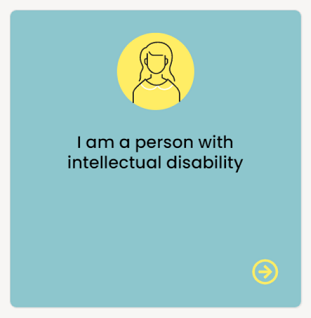
or

On Easy Read pages links show the full website address.

On standard plain English pages links look like the green underlined text.

When you hover over some buttons and links they will turn orange.
To hover means to move the cursor over the button or link using your mouse or laptop trackpad.
The cursor usually looks like a hand or arrow.
A trackpad is the small rectangle at the front of a laptop keyboard. You use your finger to move the cursor around the screen and click on things.
For example

This button is blue.
When you move the cursor over the button it turns orange.

You can then click the button to go to that page.
Links to pages on this website
Some links take you to another page on this website.
The new page will open in the same tab on your browser.
You use a browser to look at websites.
Tabs show the website pages you have open.
A tab looks like

Links to pages on other websites
Some links will take you to another website.
When you click on a link to another website, the website opens in a new tab on your browser.
This means the page you were using on this website will still be there in the other tab.
If you want to go back to this website, click on the tab to the left of the new tab at the top of your browser.
Where to click first to get information for you
To start scroll down the page and click on the button that describes you.
For example, if you are a person with an intellectual disability, click the button with I am a person with intellectual disability on it.
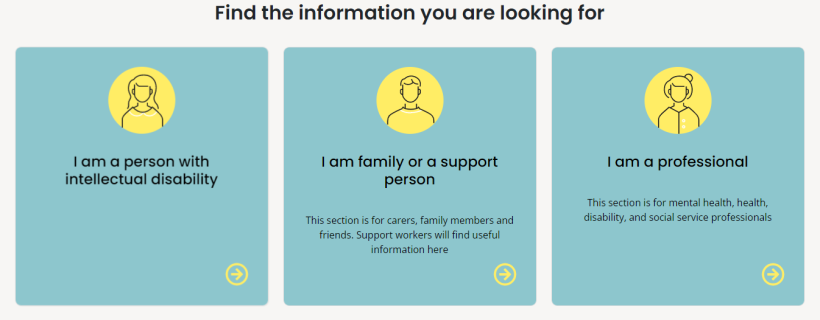
You will then find more buttons with topics you may like information on. Click on a button to find more information.
You can also use the top menu that looks like
You can either
- click on the group that describes you, or
- look at more options in the drop down menu.
A drop down menu is a menu that is hidden until you hover your cursor over it.
To hover over the menu, move your cursor over the menu using your mouse or laptop trackpad.
You do not have to click.
A list of options will appear. Click on the option you would like more information on.
For example if you want to know how to have good mental health click on Tips for good mental health.

Accessibility options
Adjust contrast
Adjusting contrast changes the colours on the page to make it easier to read for some people.
To adjust the contrast of the page on a computer, click the Contrast button up the top right of the page.

Click the button again to go back to the original colours.
Change text size
To increase the size of the text, click the Text size button up the top right of the page.
Keep clicking the button to make the text larger.
There are 4 sizes of text to choose from.

When you have reached the largest size, you will find a –A.
You can click the button again to go back to the original size.

You can also zoom in and out on your browser by pressing Ctrl and + on your keyboard.
Touch screens
You can pinch your screen to zoom in and out.
Listen to the page
To listen to the page, click the Listen button toward the top left of the page.

The controls will then appear. You can
- pause reading out the page then restart again
- stop reading out the page
- skip backward to read out the last line again
- skip forward if you do not want the next couple of lines read out
- adjust the volume to make it louder or softer
- adjust the reading speed to make it quicker or slower
- close the player.

There are also some more controls if you click the small button with 3 lines.
- Settings – you can change the settings. For example if you want the text highlighted as it is read aloud. Highlighting means there is a coloured box around the text.
- Click and Listen – this means you can listen to a paragraph when you click anywhere in that paragraph.
- Enlarge text – shows the sentence being read at the bottom of the page in large text.
- Text mode – this opens a window with mostly text. Images are also shown if they have text with them.
- Page mask – dims the screen except for the area you are reading. This can help you focus on a small part of the page. Dim means to make darker.
- Download mp3 – you can download an audio file of the page.
- Help – view the help page with more instructions on how to use the listen function.
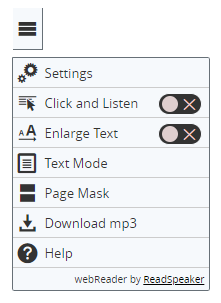
Finding your way around the website
Symbols used on the website
Around the website each topic has a matching symbol. For example
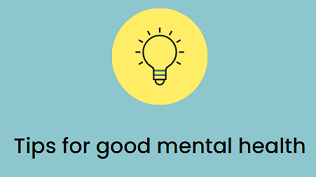
The same symbol is shown each time there is information on that topic.
You can use the symbols to help you find the information you are looking for.
Jump to a section below menu
On some of the longer pages there is a Jump to a section below menu.
This menu shows the main topics on the page.
It is like a table of contents.
It helps you find the information you want on a page.
If you want to go straight to a topic that interests you, click on that topic link in the menu.
You will then go straight to that information.
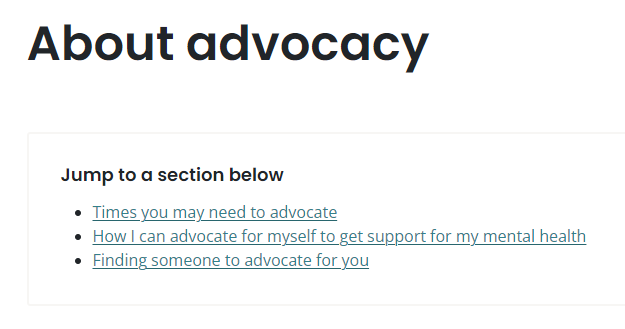
To jump to the top of the page
Click the up arrow on the bottom right side of the screen to go back to the top of a page quickly.

To go back a page
If you want to go back to the last page you visited, you can click the left arrow on your browser.
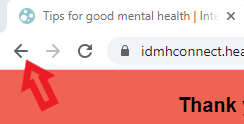
Next and previous page
In some parts of the website, information on the same topic is shown across more than one page.
To move between the pages click the Next page and Previous page buttons at the bottom of the screen.
Clicking on the Next page button will take you to the next page.

Clicking on the Previous page button will take you back to the last page.

Section links
To help you keep track of what section of the website you are on and how you got there, you can use the links under the main top menu.

The above example shows you are on a page about working with your team.
If you wanted to go back to the last section to find information on a different topic such as treatment options, you would click Getting support for my mental health.
Going back to the main page
The main page of a website is called the home page.
Click the Home button on the top left side of the screen if you want to go back to the home page.
You can also click Home in the section links.

You do not have to go back to the home page each time you want to find more information.
You can use the top menu.
Using Easy Read pages
Most information in the I am a person with intellectual disability section is available in Easy Read or, standard or plain English form.
Turn Easy Read off and on
Parts with Easy Read available have a Turn Easy Read off button toward the top right of the page.
To turn Easy Read off click the Turn Easy Read off button.

To turn Easy Read back on click the Turn Easy Read on button.

Downloading Easy Read documents
Download means to save on your computer.
If you want to save an Easy Read document to your computer click the
PDF Download

or
Word download buttons at the top right side of the screen.

A copy will save to your computer.
You can view or print out this document.
You can also share it with others.
Please note some of the Word documents are quite large and may not be able to be sent by email.
It is better to email a PDF.
More on PDFs
A PDF is a file type. To view PDFs you can download Adobe Acrobat Reader for free.
There is a user guide to support users of screen readers to access the content of PDF documents.
If you cannot use the PDF documents on this site, you may need to download a new free version of Adobe Acrobat Reader.
Watching videos
To watch a video, click the arrow in the middle of the video.
You can also choose to watch the video on YouTube by clicking the Watch on YouTube button on the lower left side.
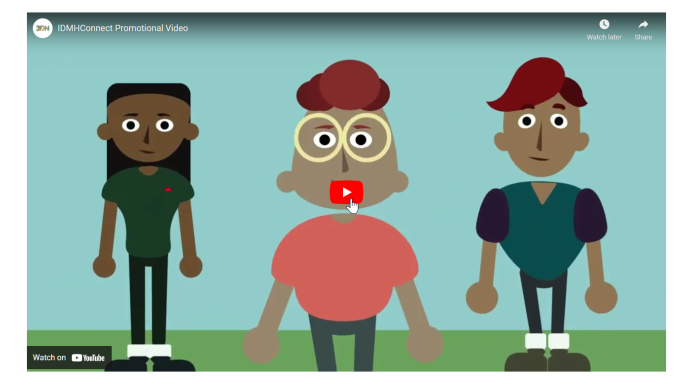
If you want text shown of the speech, click the CC button at the lower right side of the video once it starts.

Finding information right for you
Search box
You can search the website by typing one or more keywords into the search box at the top of the website.

The search box is at the top right of the screen.
For example if you want to know about services for mental health type:
services mental health
Then press Enter or click the magnifying glass on the right side of the box.
Search results will appear.
If for example a page is within the I am a person with intellectual disability section, person with intellectual disability is shown in a box below the page title.
If a page is in Easy Read this will be shown in a box below the title.

If you want to go to a certain page, click Read more.
Search assistant
The search assistant can help guide you to the information you need.
This is useful when you are not sure
- what you are looking for
- where to look for the information you need.
Click on the button that says Search assistant.
You will find this on the main home page and also on the main page for each user group.
For example at the bottom of the main I am a person with intellectual disability page.

To use the search assistant
- Click the button with the group that describes you.
- You will be taken to a new screen with options.
- Click the button with the type of information you need. There may be more than one screen like this.
- At the end you will be taken to a page with the type of information you chose.
Finding resources
Resources give you more information or help you do things. Resources can include
- other information websites
- tools to help you plan your mental health support
- factsheets.
To find resources click on the Resources button in the top right side of the screen.

You will then find buttons with resources for 3 different groups of people.
Click on the button that describes you.
You can also hover over the Resources button and the 3 different group options will drop down.
There are resources on several topics.
Next you may be interested in
At the end of many plain English pages there are buttons with links to suggested pages you may be interested in next.
You can click on the buttons to go to the suggested pages.

Keeping or sharing information
Print the page
If you would like to print an Easy Read page, download the PDF or Word version first. Click the
PDF Download

or Word Download buttons toward the top right of the page.

If you would like to print a standard plain English page, click the Print button toward the top right of the page.
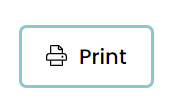
Please note only information pages have a print button.
How to share a page on social media or by email
You can share a standard plain English page with others through
Click on the buttons at the bottom of the page

If you need help
Emergency help
If you are in a crisis and need help right away click the Emergency help button at the top right of the screen.
A crisis is when you are in danger or are very upset.
You will find information on people who can help you.
FAQ page
If you have more questions about the website, you can go to the FAQ page.
FAQ stands for frequently asked questions.

If your question is not answered there you can either
- email us at [email protected]
- contact us via the Feedback page (link below the FAQ at the bottom of the page)
If you have a question and would like us to answer you, please enter
- your name
- either your email address or phone number (or both)
- the topic of your question in the Subject box
- your question in the Message box.
Then click Send message.
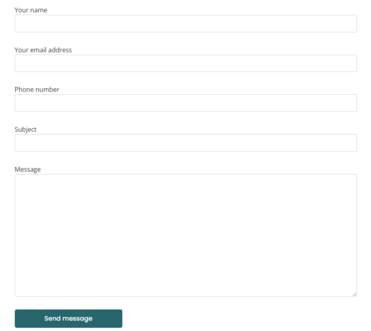
Give us feedback
Feedback means you tell us what you think of the website and how we can make it better.
We want your feedback because we want to make Intellectual Disability Mental Health Connect the best that it can be.
You can let us know any feedback you have about the website and its content
- by emailing us at [email protected]
- through the feedback form
Please enter your feedback in the Message box. If you like you can also enter
- your name
- your email address
- your phone number
- the topic of your feedback in the Subject box.
Then click Send message.

Feedback study
Until the end of September 2023 anyone who uses this website can take part in a feedback study.
If you want more information on the study, click here on the red information banner at the top of the website.

Quick feedback box
You can also give us feedback through the quick feedback box.
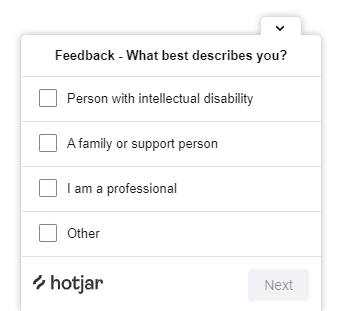
- First click the box that best describes you.
- Click Next.
- Let us know if you found the information you were looking for. Click 1 for strongly disagree through to 5 for strongly agree.
- Click Next.
- Type in any feedback you have about the website. This could be things you like or do not like about the website.
- Click Next to send your feedback.
You can give us feedback as many times as you like.
You do not have to fill out the survey if you do not want to. You do not have to fill it in each time you visit the website either.
If you want to make the feedback box go away, click the down arrow in the top right corner. If you want it to appear again, click the up arrow.